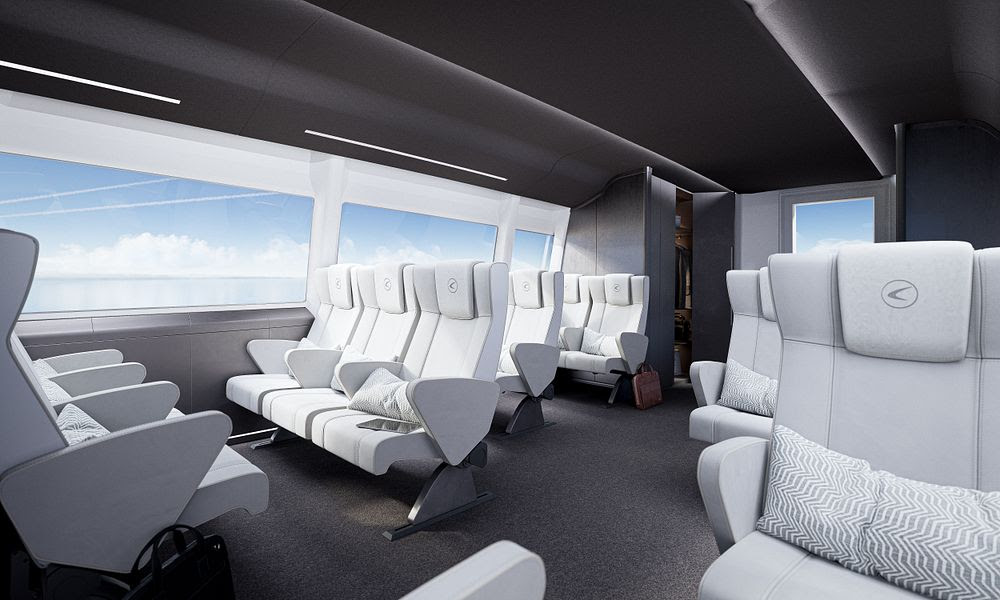Electric Candela P-12 hydrofoil completes test crossings in Stockholm

In a breakthrough advance for sustainable maritime transport, Swedish tech company Candela Technology has announced that the Candela P-12 – the world’s first electric hydrofoiling passenger vessel – has completed test crossings in Stockholm.
First announced in concept form in June 2022, the P-12 employs computer-guided hydrofoils to elevate its hull above water friction. When foilborne at speeds over 18 knots, the Candela P-12 consumes 80% less energy than traditional high-speed vessels. This innovation addresses the primary challenges that have hindered the widespread adoption of fast electric vessels: limited range and slow speeds due to the excessive energy consumption of conventional hulls.
During the crossings, the Candela P-12 confirmed its top speed of 30 knots, a record for electric passenger vessels. With a range of up to 50 nautical miles, it is also the first electric ship with the practical endurance to cover most coastal transport needs, the manufacturer claims.
Maritime transport represents 3% of global CO2 emissions, a figure projected to grow to 13% in the coming decades if no action is taken. High hopes are therefore placed on electric vessels, with the market for electric ships estimated to hit US$ 31.48 billion by 3034.
However, electric vessel adoption today is extremely low, even on urban and coastal waterways, due to their high cost and limited performance.
Priced at €1.7 million, the 30-seat Shuttle variant of the P-12 matches the cost of similar-sized ICE (internal combustion engine) vessels and is priced significantly lower than other electric options. This is possible thanks to its hydrofoil efficiency, which enables an extended range from a modest 252 kWh battery. Combined with a streamlined serial production, this leads to industry-low overall unit costs.
Says Erik Eklund, Candela’s Director for Commercial Vessels:
“With the P-12, we’re not just offering a faster, more comfortable electric alternative to fossil fuel-powered vessels. We enable operators to make the switch to sustainable vessels that are cost-effective and profitable, a crucial step towards clean oceans and lakes.”
Once in service, operators can expect reduced ‘fuel’ costs by up to 90% compared to diesel vessels. In total, the P-12 is expected to cut costs per passenger kilometer by up to 50%, achieving a similar operational per-passenger economy as a hybrid electric bus.

The P-12 is a versatile platform designed to accommodate an array of use cases and clients, from public transport to bespoke private shuttles. It is available in three variants: the P-12 Shuttle, P-12 Business, and P-12 Voyager.
The Shuttle configuration seats 30 passengers and sets the benchmark for sustainable commuting with the lowest operational costs in the industry, the manufacturer claims. Allocated space for bicycles (along with strollers and wheelchairs) encourages the integration of cycling with public transport.
The Business version features a premium interior with seating for 12 to 20 passengers (and plenty of suitcases), and the highly adaptable Voyager version offers customers flexibility in interior design, catering to both private leisure and commercial clients.
In a pilot, the Candela P-12 Shuttle is set to join Stockholm’s public transport network in 2024, reducing the Ekerö suburb-city centre commute from 55 to 25 minutes, surpassing cars, buses, and current diesel ferries in speed. This is possible by obtaining an exemption from the city center’s speed limits, thanks to the vessel’s minimal wake.
Candela P-12 Specs
Length: 11.99 meters
Beam: 4.5 meters
Payload: up to 30 passengers
Battery: 252 kWh
Motors: 2 x Candela C-POD MAX, 340 kW total peak power
Charging: 175 kW DC charging, overnight AC charging
Top Speed: 30 knots
Service Speed: 25 knots
Range: 40 to 50 nautical miles at 25 knots depending on version and load
Price €1.7M for Shuttle configuration

